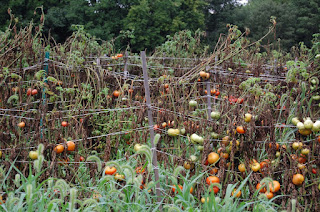When blackness was a virtue and the road was full of mud
I came in from the wilderness, a creature void of form.
Come in, she said,
Ill give you shelter from the storm.
Whether it be storms or droughts, insects or disease, oppressive heat and humidity, bitter cold with bone chilling wind, farmers have been at the mercy of the elements throughout the course of time. Over the course of time farming changed from small farms that used methods of farming that was conducive to good taste and colorful appearance to large, industrial type farms whose main goal was to make food as inexpensive as possible even at the risk of decreasing the flavor of some of the produce. Farming changed to include the use of chemicals to prevent and treat disease, to protect the plants from bugs, and to allow the produce to be shipped many, many miles and to have a long shelf life. In the process people lost contact with the people who were producing their food and took their food for granted. In recent times, things have started to change back to 'the good old days'; food increasingly grown in a manner that is local, sustainable, and abstains from using chemicals that are less than healthy for the plants, the soil, and the consumer. Organic farmers are thus more vulnerable to the elements. During the current growing season many/most/all organic crops throughout the northeast, including Pennsylvania and areas as far west as Ohio, are being afflicted by various ailments. Two in particular are particularly devastating to organic farmers- late blight and downy mildew. In the previous posting links to two articles were offered to provide information about tomato blight. Another article that addresses the issue of blight and its impact can be reached through the following link- http://www.nytimes.com/2009/08/09/opinion/09barber.html?_r=1&scp=1&sq=Dan Barber&st=cse
One suggestion from the article to mention- if you are going to do home gardening and you don't want to start your own plants from seed, buy your plants from local farmers or local nursery's who have started their plants from scratch. This point is being made due to the blight being partially the result of diseased plants that were started elsewhere being sold at 'box' stores where the disease went unrecognized. If you are supportive of local, sustainable, organic agriculture and want your own garden, buy your plants from a local supplier of plants. With this in mind the problem with late blight and downy mildew has been exacerbated by the wet weather conditions throughout this farm season. Farmer David is not alone in having his crops effected by disease; this is particularly true for all organic farmers. While there are some substances that are organically approved to combat pests and disease, conventional farmers are much better able to protect their plants from disease. For Farmer David, in addition to the tomato plants being struck by late blight, downy mildew has had a stark impact on cucumbers and summer squash. Basil and winter squash have also been damaged.
Last season Farmer David had head lettuce for sale at the farmers' markets every week but one. He had salad mix almost as often. This season due to wet ground lettuce plants did not get planted, some that were planted were unable to be harvested and salad mix and arugula were unable to be directly seeded into the ground. As you consider the impact of weather and disease on small, local, organic farmers, please make it a point to buy your produce at farmers' market and help local, organic farmers remain a viable alternative to the traditional chain supermarkets. Yes, these stores have a role to play in providing us with food throughout the year when local produce is unavailable and providing a wider diversity of food in an area whose climate is not conducive to certain items.
Remember- Shop at farmers' markets. Buy organic. Get to know your farmer. Ask questions about your food. Enjoying good food is at your finger tips. To all who have enjoyed Gravity Hill produce at the New Hope Market, the Pennington Market, the Lawrenceville Market, and from the farm stand, thank you for your support. Your use of Gravity Hill Organic Farm for your produce needs is greatly appreciated.
Happy and healthy eating to all.
Seeding, germinating, and planting continue. To borrow from the wisdom of Yogi, 'the growing season ain't over 'til it's over'.

From germinating seed into the field. The process is ongoing. From the fields of Gravity Hill to a farmers' market near you.

Now, if can only stop raining all of this wonderful stuff will make it to your table.

This is what downy mildew does to plants. As goes the plants, so goes the fruit being produced by the plant.


Here it is, tomato plants with late blight.


As you can see in this picture, the plants are, despite all odds, attempting to continue to produce fruit. To date David has been able to bring an abundance of tomatoes to market. Not as many as would have been available. Not as many varieties as had been planted. And certainly not lasting as long into the season as they otherwise would have been available. However, plenty of tomatoes nonetheless. In this David and Gravity Hill have been far more fortunate than many other farms throughout the afflicted area.

Pretty as a picture. Oh, it is a picture. It is even prettier in person.

Again, thanks to all who come to market. Remember, farming is hard work and it takes a total effort on the part of Farmer David, David E. and Maria as well as all the people who work at the farm. Thank a farmer, any farmer, for their hard work.
Peace and healthy eating to all.

No comments:
Post a Comment